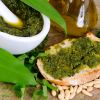Craft beer made in Germany
Craft beer is the talk of the town these days. In Germany, more and more innovative brewers are producing outstanding non-mainstream beers.
It gives off a delicious aroma of chocolate and fruits of the forest, and with an alcohol content of 7.5 percent is so strong that even men are more than happy to indulge in this supposed “women’s beer” – and this despite the fact that it is served in wine glasses and comes in rather glamorous bottles adorned with pink labels. At the end of the day, a good beer is a good beer. Indeed, what the four young female master brewers from Upper Franconia have brought out as a winter edition of their “Holladiebierfee” (a beer targeted specifically at women) is even more than just a good beer: it is an excellent example of a trend that has now also taken root in Germany – craft beer.
Craft beer is brewed in small quantities and is anything but run of the mill – based on recipes that are sometimes old but always special, traditional brewing techniques are used and the beers are generally produced in independent breweries. More than 90 percent of the 1,339 breweries in Germany are independent, giving rise to a huge diversity of beers. This is because it is precisely small, regional producers which do not have to take the tastes of the masses into account and can afford to give free rein to their creativity. Like the Riedenburger brewery in Germany’s Altmühl Valley, for instance, which switched to organic brewing back in 1994 and enriches the beer world with speciality beers made from einkorn, emmer and spelt. Since 2013, the brewery has also produced “Dolden Sud”, an organic India Pale Ale – a hip variety of IPA that is very much on the up.
It’s not only in the south of Germany and in rural regions that craft beer is gaining in popularity, however – unique beers are being brewed with a vengeance in the country’s major cities, too. Berlin in particular is increasingly establishing itself as the capital of the German craft beer movement – it is home for example to the Vagabund brewery founded by three American teachers in the city’s Wedding district, and to Johannes Heidenpeter, an artist who brews and serves his beer in the basement of Kreuzberg’s “Markthalle Neun”. His customers’ favourite is “Thirsty Lady”, a fruity, blond and light beer.
This is another special feature of the new beers – they have character and a taste of home. What is more, they offer something one would not have thought down-to-earth German beer capable of: glamour, eccentricity and the heady aroma of rebellion.
© www.deutschland.de

